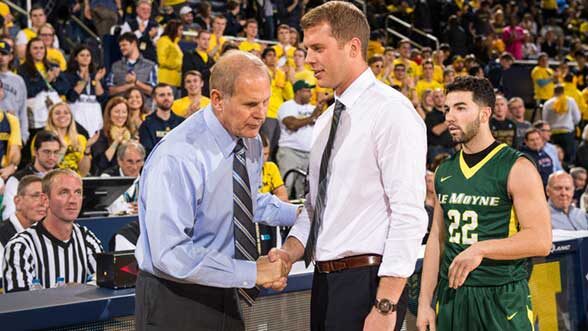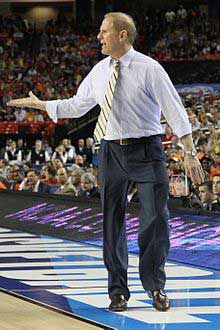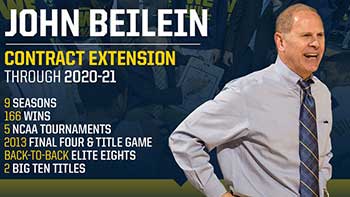Big shoes
Patrick Beilein was born the day before his father, John, got the basketball head coaching position at Le Moyne College. He spent the first nine years of his life in Syracuse, N.Y., as his father coached the Dolphins.
This summer, Patrick, 32, became the head coach at Le Moyne. He’s retracing his father’s footsteps as the oldest and only one of three sons to go into coaching. And on Nov. 6, in an exhibition game at Crisler Center, Beilein & Son matched teams and wits.
It wasn’t a very competitive game, which was expected with the Division II Dolphins, as the Wolverines won, 74-52. But the story in this game was about life coming full circle with roundball.
There was plenty of emotion prior to tipoff.
“The ‘moment’ came when we shook hands in the very beginning,” says Patrick. “I said to him, ‘Well, the day’s finally come. Here we are.’ And he said, ‘You’re right, here we are.’ I don’t think either of us knew what to say, and we just smiled.”
Is it a handshake or a hug?
His father asked others, including Michigan football coach Jim Harbaugh, for advice on the pre-game meeting. Harbaugh had encountered just such a moment on a much larger stage, going against his older brother, John, as Super Bowl head coaches.
“It was funny,” John Beilein says. “I asked the question of my staff: ‘What is appropriate when you play against your son? Is it a hug or is it a handshake?’ Jim Harbaugh actually texted me and said, ‘Enjoy the moment.’ And I asked him, ‘What do you do? Is it a handshake or a hug?’ I think he said, ‘Do both.’ But it was a little different.”
Did either one have a point during the game when the father-son aspect got to them?
“No,” John says with a smile. “I was trying to get my team ready. Kathleen [his wife] could’ve been on the other bench, and I’d have been trying to get my team to play better.”
However, Patrick had another memorable instant when he saw his father in the huddle with the Michigan assistants and players.
“He was game-planning to stop Le Moyne, and that was kind of funny,” he says.
Meanwhile, Kathleen Beilein showed her support to both husband and son, wearing a Le Moyne patch sewn on a T-shirt beneath her Michigan T-shirt.
And more than 70 aunts, uncles, and cousins made it to the game from across the country, wearing silk-screened white T-shirts that read “Michimoyne,” courtesy of Patrick’s school.
“It showed how much they are invested in our family,” says Patrick, one of 44 grandchildren to his father’s parents, both of whom are deceased.
All in the family
There was a mirror-image aspect to the game. At one point in the first half, both father and son, wearing long-sleeve shirts and ties with slacks, stood with both hands on their hips and squared up straight to view the action on the court.
Sons who love and adore their fathers often share demeanors, approaches, and mannerisms. The Beileins are in that group.
Patrick was a graduate assistant for two years at Michigan before becoming an assistant coach at Dartmouth, director of basketball operations at Bradley, head coach at West Virginia Wesleyan College, and a player development coach for the Utah Jazz.
My first question, in a recent phone interview, was about how his father impacted him away from basketball.
“He’s a better father — if you can believe that — than he is a coach,” Patrick says.
Father’s day
I shared a story with Patrick about his father in that regard. I was writing for the Tampa Tribune seven years ago and interviewing the mother of Alex Ruoff, who played with Patrick at West Virginia when his father coached them both. Kim Ruoff had overcome a severe degenerative condition that had left her wheelchair-bound with slurred speech and internal organ damage and was the subject of a Mother’s Day feature.
We made small talk at the Ruoff home in Spring Hill, Fla., and John Beilein entered the conversation. She told me that Beilein had sat in the same chair I was now occupying and promised to take care of her son like a father. The single mother who had raised three children through her trials said Beilein came through with flying colors in that regard, even surpassing her expectations.
“Dad’s always been like that with his players,” Patrick says. “And when we had conversations, it was always father-son. He’d come around in the morning when I was in high school and quiz me on a test I was going to have.
“He always knew what was going on in our lives, and my mom and dad both separated from his job as parents.”
The fundamentals
As far as coaching goes, Patrick says his father, “who is a lot calmer on the sidelines than he was at Le Moyne,” stressed to him the importance of being more controlled with game officials than he’d been as a young coach. The father was 30 when he got the job his son now holds.
“The biggest influence he had on me in the game was teaching me the fundamentals,” says Patrick. “I wasn’t the most athletic guy and helping teach me the game the right way — what is a good shot, what is a bad shot — and he also didn’t overwhelm me with things. He always waited for me to ask. He wanted us to enjoy sports.”
Patrick’s younger brothers, Mark, 31, and Michigan graduate Andrew, 25, also played on teams but gravitated to the business world. His sister, Seana Hendricks, 35, is married and the mother of three children, living in Ann Arbor.
“Dad wanted to see us be good but didn’t force anything on us,” says Patrick, who helped lead West Virginia to Elite Eight (2005) and Sweet 16 (2006) NCAA Tournament runs in his final two seasons. He was a senior co-captain, finishing with 1,001 points and 242 three-pointers to rank second on the school’s career list.
Patrick played for the Houston Rockets’ entry in the NBA’s summer league after graduating and spent two years playing in Europe before joining Dad at Michigan.
“I’d always seen him in the mornings watching film,” he says of his father. “I’d see all of his practice plans around the house, and he always had rough drafts of them. So, I saw that what he put into every practice and game was extraordinary. Seeing how good he felt after wins made me feel real good because I knew how much time he invested in them.
“Then, when working for him as a grad assistant, I got to see how his mind worked: ‘How can we get better today in every way?’ It was incredible to watch. It’s why he’s been so successful at every stop.”
Cultural significance
Beilein became a college head coach at Erie Community College in 1978 and went from there to Nazareth College before Le Moyne, Canisius, Richmond, West Virginia, and finally Michigan. He took each of his four Division I programs to the NCAA tourney, has a 717-428 record entering his 38th season, and recently received a contract extension that will keep him with the Wolverines through 2020-21.
At each stop, Patrick watched his father create a culture as surely as a team.“He’s always coached the importance of a culture,” says Patrick. “There’s a type of kid he wants to coach. He brought about a culture change at West Virginia, and I believe that won us a lot of games. We were a tight-knit group, and he did a great job of teaching that, and that fit is what he’s always thinking first.”
His son says he “absolutely” strives to do likewise as a coach.
“What I remember most is going to the NCAA Tournament in his second season (2008-09) after Michigan had missed it for so many years,” says Patrick of the 11-year drought his father’s team ended. “It was hard on me when they only won 10 games his first year. They turned the corner slowly, but Dad stayed positive just like he had every stop along the way.”
Born to coach
The father has worked magic at every stop, and now it’s his son’s turn to chase the dreams.
“I went to practices with Dad as a young boy,” Patrick says. “He would take us on recruiting trips, especially on weekends. That was the lifestyle he lived and evolved us in.
“I was born in Rochester, N.Y., where Nazareth was, and the day after that Dad got offered the Le Moyne job. So, we moved to Syracuse, where we thought Le Moyne was the big basketball team.”
Patrick laughs about the days when powerful Syracuse University, right down the road, wasn’t even on his radar. It was all about the Dolphins for the Beileins, and now that’s the case once again for him.“I saw a basketball the other day, that I now have in my office, of the NCAA Regional game ball when they went there in 1987-88,” says Patrick. “I looked at all the names of the players on it, and his name. And now, I’m so fortunate to be in this position.
“Obviously, Nov. 6 was a very emotional kind of day,” he continues. “Every time I’ve come to this arena it’s been to root for my dad. But I got off the bus and went down the opposite tunnel where the opponents go. It was an eerie feeling, and I really didn’t like it.
“But it turned into another game, and we were trying to beat one another.”
Once the competition with his father ended, Patrick’s reality returned to normal: “I’ll be the biggest Michigan fan from here on out.”
This story originally appeared at mgoblue.com.







John Korstad - 1980 (PhD)
Loved this story – heart-warming and wonderful tribute to both father and son. 🙂
Reply
Jim Lein - 1970 MSW
I am undoubtedly one of a very few who wonder how the Beilein’s pronounce their name. I’ve heard announcers say Bee-line. It seems that the double E-I should be either By-line or Bee-lean. Or perhaps it is By-lean?
Reply